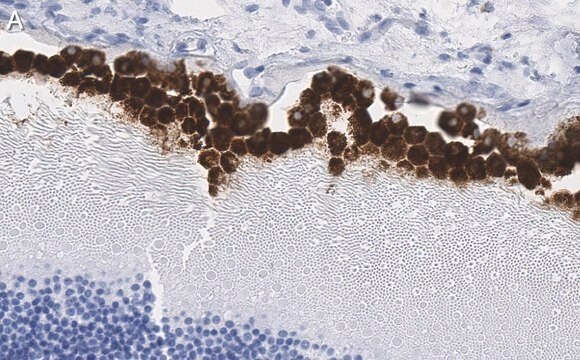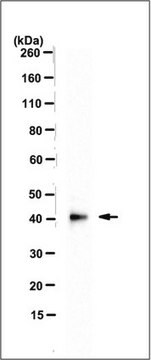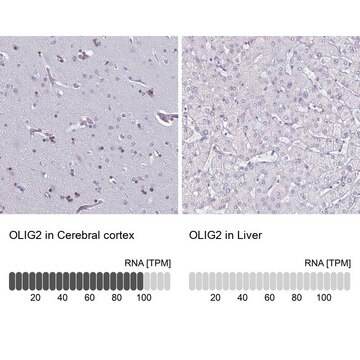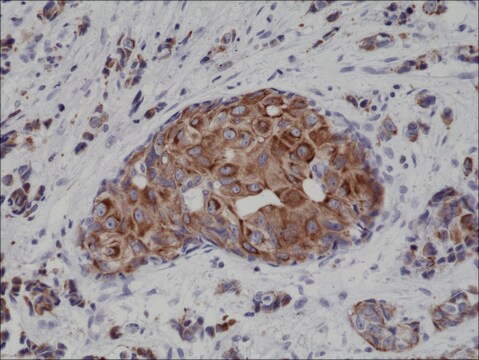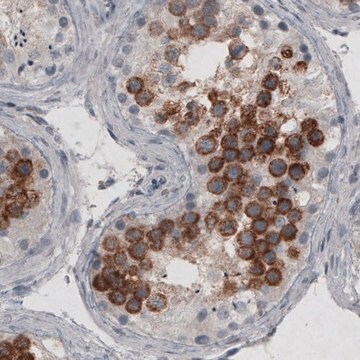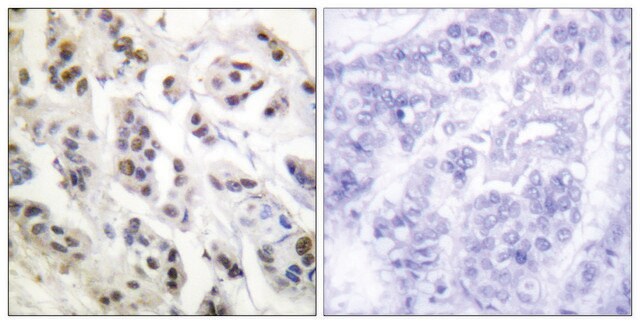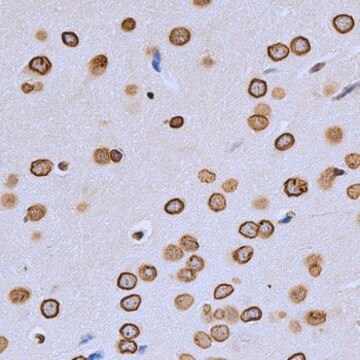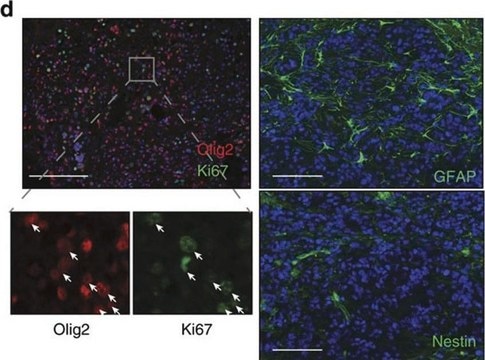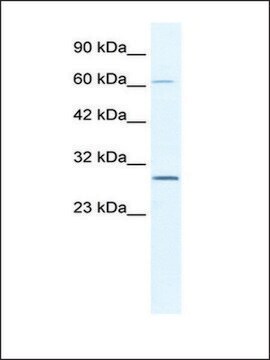おすすめの製品
由来生物
mouse
品質水準
100
500
結合体
unconjugated
抗体製品の状態
culture supernatant
抗体製品タイプ
primary antibodies
クローン
35betaH11, monoclonal
詳細
For In Vitro Diagnostic Use in Select Regions (See Chart)
フォーム
buffered aqueous solution
交差性
human
包装
vial of 0.1 mL concentrate (335M-94)
vial of 0.5 mL concentrate (335M-95)
bottle of 1.0 mL predilute (335M-97)
vial of 1.0 mL concentrate (335M-96)
bottle of 7.0 mL predilute (335M-98)
メーカー/製品名
Cell Marque®
テクニック
immunohistochemistry (formalin-fixed, paraffin-embedded sections): 1:100-1:500
アイソタイプ
IgMκ
コントロール
prostate
輸送温度
wet ice
保管温度
2-8°C
視覚化
cytoplasmic
遺伝子情報
human ... KRT1(3848)
詳細
Anti-Cytokeratin 8 stains most non-squamous epithelial tumors, squamous tumors are negative for this antibody as a rule. This antibody stains adenocarcinomas of the breast, ovary, gastrointestinal tract, thyroid, pancreas, bile duct, and salivary glands. This antibody does not react with skeletal muscle or nerve cells.
品質
 IVD |  IVD |  IVD |  RUO |
関連事項
Cytokeratin (35betaH11) Positive Control Slides, Product No. 335S, are available for immunohistochemistry (formalin-fixed, paraffin-embedded sections).
物理的形状
Solution in Tris Buffer, pH 7.3-7.7, with 1% BSA and <0.1% Sodium Azide
調製ノート
Download the IFU specific to your product lot and formatNote: This requires a keycode which can be found on your packaging or product label.
その他情報
For Technical Service please contact: 800-665-7284 or email: service@cellmarque.com
法的情報
Cell Marque is a registered trademark of Merck KGaA, Darmstadt, Germany
適切な製品が見つかりませんか。
製品選択ツール.をお試しください
最新バージョンのいずれかを選択してください:
A C Knapp et al.
Cell, 59(1), 67-79 (1989-10-06)
Intermediate filaments (IFs) of the cytokeratin (CK) type are cytoskeletal elements typical for epithelial differentiation. However, in diverse transformed culture lines of non-epithelial origin, rare cells emerge spontaneously, which synthesize, in addition to their vimentin IFs, CKs 8 and 18.
R Eichner et al.
The Journal of cell biology, 98(4), 1388-1396 (1984-04-01)
Human epidermal keratinocytes express under various growth conditions a total of at least nine keratins that can be divided into two subfamilies. Subfamily A comprises 40-, 46-, 48-, 50-/50'-, and 56.5-kilodalton (kd) keratins which are relatively acidic (pI less than
A M Gown et al.
American journal of clinical pathology, 84(4), 413-424 (1985-10-01)
A panel of monoclonal antibodies to human intermediate filament proteins was tested on an unselected series of 246 neoplasms. The antibody panel includes two different anti-cytokeratin antibodies, an anti-vimentin antibody, and an anti-neurofilament antibody (Gown and Vogel, Am J Pathol
T T Sun et al.
The Journal of investigative dermatology, 81(1 Suppl), 109s-115s (1983-07-01)
Keratins are a group of water-insoluble proteins (molecular weight range 40-70 K) that form 10-nm tonofilaments in a wide variety of epithelial cells. The subunit composition of the keratin filaments varies with cell type, period of embryonic development, stage of
H Battifora
The American journal of surgical pathology, 12 Suppl 1, 24-42 (1988-01-01)
The past few years have seen great progress in our knowledge of the biology and the chemistry of intermediate filaments and other filamentous proteins. This has translated into the development of antibodies that, together with new, highly sensitive immunohistochemical methods
ライフサイエンス、有機合成、材料科学、クロマトグラフィー、分析など、あらゆる分野の研究に経験のあるメンバーがおります。.
製品に関するお問い合わせはこちら(テクニカルサービス)